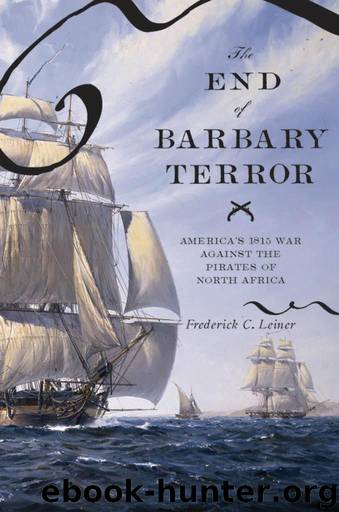The End of Barbary Terror: America's 1815 War against the Pirates of North Africa by Leiner Frederick C

Author:Leiner, Frederick C. [Leiner, Frederick C.]
Language: eng
Format: azw3
Publisher: Oxford University Press
Published: 2006-04-30T16:00:00+00:00
Chapter Six
The Return
WILLIAM BAINBRIDGE arrived at Carthagena with the second squadron on August 5, thirty-four days out from Boston. Crowninshield had sent him his sailing orders on June 17, the very day Decatur’s squadron mauled and captured the Meshuda, a fact that no one in the United States could possibly have known for weeks to come. Crowninshield’s orders were clear and decisive. Bainbridge was to sail to the Mediterranean with the ships ready for sea at Boston, following the orders the department had sent to Decatur, as well as the State Department’s directives for concluding a peace treaty. Lest there be any doubt, the “object of the expedition,” Crowninshield explained, “is to obtain an honorable Peace with the Dey of Algiers, with whom we are at War, or to destroy his Fleet, Blockade his Ports, cut up his commerce, in short to practice against him and his people all the rigour of civilized Warfare, until he is compelled to make a Peace.” In Washington, the administration had heard rumors that one or more of the European nations might have declared war against Algiers, and the Dutch specifically were said to have sent a powerful squadron to fight. If the rumors proved true, and not knowing in mid-June that Decatur would soon conclude a peace treaty with Algiers, “should it become a question of policy, or an object of importance to your success, to act in consort with [the Dutch fleet], you are permitted by the President so to act in consort with any naval power at war with Algiers in any manner which shall be best calculated to effect the object of the enterprize, taking care to preserve to yourself and your Government the proper rank and respect.” Secretary Crowninshield’s directive was the first time in United States history that the navy had been allowed to sail and fight as part of a multinational force. The rumors were not far wrong. The Dutch had a squadron sailing about the western Mediterranean, looking to fight. Indeed, a year later, John Quincy Adams, the United States minister to the British court, had a conversation with the Russian ambassador, who asserted that the Dutch wanted “concerted operations,” Spain had actually proposed that “a joint naval armament” be fitted out to act against the Barbary states, and while the czar had not quite signed on for Russia, he recognized “the inconvenience of partial operations and negotiations, which, by making peace for one or two nations, would immediately have the effect of producing hostilities against others.”
If the European world was starting to coalesce against Christian slavery in Islamic North Africa, the United States had somewhat unrealistic expectations of assistance from the other Barbary regencies. In his June 17 orders, Crowninshield asserted to Bainbridge—ironically, as it turned out—that “no doubt is entertained” that Tunis and Tripoli, as well as “the different courts of Europe,” would “render you every assistance that friendly nations ought to do.” Before Decatur’s squadron had sailed in May, naively relying on traditional
Download
This site does not store any files on its server. We only index and link to content provided by other sites. Please contact the content providers to delete copyright contents if any and email us, we'll remove relevant links or contents immediately.
| Africa | Americas |
| Arctic & Antarctica | Asia |
| Australia & Oceania | Europe |
| Middle East | Russia |
| United States | World |
| Ancient Civilizations | Military |
| Historical Study & Educational Resources |
The Travels of Reverend Ólafur Egilsson: The Story of the Barbary Corsair Raid on Iceland in 1627 by Ólafur Egilsson & Karl Smári Hreinsson(592)
Pirates of Barbary: Corsairs, Conquests and Captivity in the Seventeenth-Century Mediterranean by Adrian Tinniswood(526)
Phantom Major by Virginia Cowles(396)
The Iberian World by Fernando Bouza;Pedro Cardim;Antonio Feros;(378)
The Battle for North Africa by Glyn Harper(363)
The Animal in Ottoman Egypt by Alan Mikhail(360)
Roman Legionary vs Carthaginian Warrior by David Campbell(354)
Eritrea at a Crossroads by Andebrhan Welde Giorgis(332)
Collapse of a Country: A Diplomat's Memoir of South Sudan by Nicholas Coghlan(328)
The Barbary Wars by Frank Lambert(327)
The End of Barbary Terror: America's 1815 War against the Pirates of North Africa by Frederick C. Leiner(304)
Christianity in Roman Africa by Burns J. Patout Jr.; Jensen Robin M.; & Robin M. Jensen(302)
The Sands of Kalahari by William Mulvihill(285)
A History of the Mediterranean Air War 1940–1945 by Christopher Shores(278)
Morocco by C. R. Pennell(270)
A Line in the River by Jamal Mahjoub(249)
The Holocaust and North Africa by Aomar Boum Sarah Abrevaya Stein(245)
The Making of a Mediterranean Emirate by Rouighi Ramzi;(244)
A History of South Sudan by Rolandsen Øystein H. & Daly M. W. & Rolandsen Øystein H. & Daly M. W(240)
